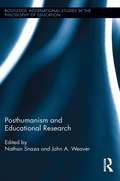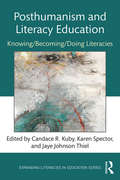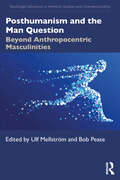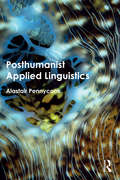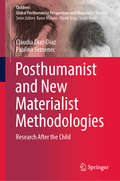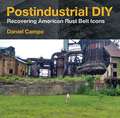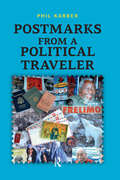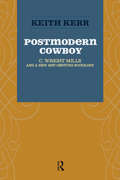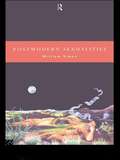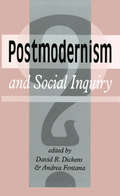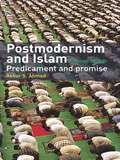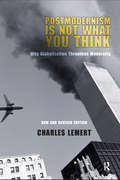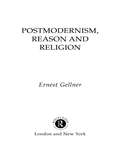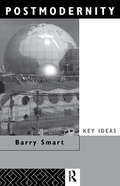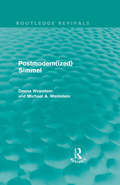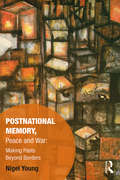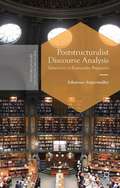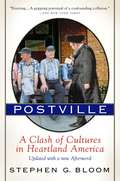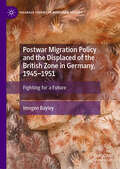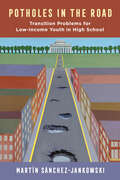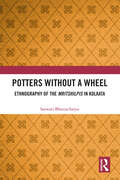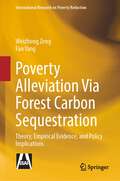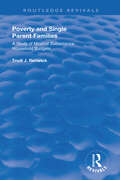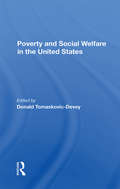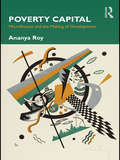- Table View
- List View
Posthumanism and Educational Research (Routledge International Studies in the Philosophy of Education)
by John Weaver Nathan SnazaFocusing on the interdependence between human, animal, and machine, posthumanism redefines the meaning of the human being previously assumed in knowledge production. This movement challenges some of the most foundational concepts in educational theory and has implications within educational research, curriculum design and pedagogical interactions. In this volume, a group of international contributors use posthumanist theory to present new modes of institutional collaboration and pedagogical practice. They position posthumanism as a comprehensive theoretical project with connections to philosophy, animal studies, environmentalism, feminism, biology, queer theory and cognition. Researchers and scholars in curriculum studies and philosophy of education will benefit from the new research agendas presented by posthumanism.
Posthumanism and Literacy Education: Knowing/Becoming/Doing Literacies (Expanding Literacies in Education)
by Candace R. Kuby Karen Spector Jaye Johnson ThielCovering key terms and concepts in the emerging field of posthumanism and literacy education, this volume investigates posthumanism, not as a lofty theory, but as a materialized way of knowing/becoming/doing the world. The contributors explore the ways that posthumanism helps educators better understand how students, families, and communities come to know/become/do literacies with other humans and nonhumans. Illustrative examples show how posthumanist theories are put to work in and out of school spaces as pedagogies and methodologies in literacy education. With contributions from a range of scholars, from emerging to established, and from both U.S. and international settings, the volume covers literacy practices from pre-K to adult literacy across various contexts. Chapter authors not only wrestle with methodological tensions in doing posthumanist research, but also situate it within pedagogies of teaching literacies. Inviting readers to pause, slow down, and consider posthumanist ways of thinking about agency, intra-activity, subjectivity, and affect, this book explores and experiments with new ways of seeing, understanding, and defining literacies, and allows readers to experience and intra-act with the book in ways more traditional (re)presentations do not.
Posthumanism and the Man Question: Beyond Anthropocentric Masculinities (Routledge Advances in Feminist Studies and Intersectionality)
by Bob Pease Ulf MellströmThis book brings together the emerging insights of what posthumanism, new materialism and affect theory mean for ‘the man question’. The contributors to this book interrogate the question of how ‘Man’ as a gendered being is entangled with nature, culture, materiality and corporeality, and they explore ways to unsettle men’s sense of sovereignty to decentre anthropocentric masculinity. Men have to move from the centre of privilege which grants them supremacy before they can open themselves to the decentred, embodied, affective, vulnerable and relational self that is necessary to embrace the posthuman. This book explores the extent to which this is possible. The book will be of interest to academics, students and scholars across a range of disciplines who are engaging with the intersections of feminist studies with posthumanism and new materialism, especially as they relate to critical studies of men and masculinities. Chapters on fathering, pornography, ageing, affect, embodiment, entanglements with technology and nature and the implications of these issues for changing men and masculinities and the politics of critical masculinity studies’ engagement with posthuman feminisms will interest students and academics across these diverse disciplines.
Posthumanist Applied Linguistics
by Alastair PennycookDrawing on a range of contexts and data sources, from urban multilingualism to studies of animal communication, Posthumanist Applied Linguistics offers us alternative ways of thinking about the human predicament, with major implications for research, education and politics. Exploring the advent of the Anthropocene, new forms of materialism, distributed language, assemblages, and the boundaries between humans, other animals and objects, eight incisive chapters by one of the world's foremost applied linguistics open up profound questions to do with language and the world. This critical posthumanist applied linguistic perspective is essential reading for all researchers and students in the fields of Applied Linguistics and Sociolinguistics.
Posthumanist and New Materialist Methodologies: Research After the Child (Children: Global Posthumanist Perspectives and Materialist Theories)
by Claudia Diaz-Diaz Paulina SemenecThis book features interviews with 19 scholars who do research with children in a variety of contexts. It examines how these key scholars address research 'after the child’ by exploring the opportunities and challenges of drawing on posthumanist and materialist methodologies that unsettle humanist research practices.The book reflects on how posthumanist and materialist approaches have informed research in relation to de-centering the child, re-thinking methodological concepts of voice, agency, data, analysis and representation. It also explores what the future of research after the child might entail and offers suggestions to new and emerging scholars involved in research with children. Reviewing how posthumanist and materialist approaches have informed authors’ thinking about children, research and knowledge production, the book will appeal to graduate students and emerging scholars in the field of childhood studies who wish to experiment with posthumanist methodologies and materialist approaches.
Postindustrial DIY: Recovering American Rust Belt Icons (Polis: Fordham Series in Urban Studies)
by Daniel CampoChronicles grassroots efforts to recover, rebuild, and enjoy architecturally iconic but economically obsolete places in the American Rust Belt.A pioneering Detroit automobile factory. A legendary iron mill at the edge of Pittsburgh. A campus of concrete grain elevators in Buffalo. Two monumental train stations, one in Buffalo, the other in Detroit. These once-noble sites have since fallen from their towering grace. As local elected leaders did everything they could to destroy what was left of these places, citizens saw beauty and utility in these industrial ruins and felt compelled to act. Postindustrial DIY tells their stories.The culmination of more than a dozen years of on-the-ground investigation, ethnography, and historical analysis, author and urbanist Daniel Campo immerses the reader in this postindustrial landscape, weaving the perspectives of dozens of DIY protagonists as well as architects, planners, and preservationists. Working without capital, expertise, and sometimes permission in a milieu dominated by powerful political and economic interests, these do-it-yourself actors are driven by passion and a sense of civic duty rather than by profit or political expediency. They have craftily remade these sites into collective preservation projects and democratic grounds for arts and culture, environmental engagement, regional celebrations, itinerant play, and in-the-moment constructions. Their projects are generating excitement about the prospect of Rust Belt life, even as they often remain invisible to the uninformed passerby and fall short of professional preservation or environmental reclamation standards.Demonstrating that there is no such thing as a site that is “too far gone” to save or reuse, Postindustrial DIY is rich with case studies that demonstrate how great architecture is not simply for the elites or the wealthy. The citizen preservationists and urbanists described in this book offer looser, more playful, and often more publicly satisfying alternatives to the development practices that have transformed iconic sites into expensive real estate or a clean slate for the next profitable endeavor. Transcending the disciplinary boundaries of architecture, historic preservation, city planning, and landscape architecture, Postindustrial DIY suggests new ways to engage, adapt, and preserve architecturally compelling sites and bottom-up strategies for Rust Belt revival.
Postmarks from a Political Traveler
by Phil KarberAs spring and summer vacations beckon, this book invites and incites a whole new approach to travel. "Postmarks from a Political Traveler" is a series of travel recollections confronting the troubling topics of roots and racism, polar bears and climate change, anti-Americanism, and the war in Afghanistan. The book opens with the story of the author s experience growing up in the Jim Crow South, traveling in apartheid South Africa, and living in the post-apartheid South Africa of 2009 and 2010. It explores the not-so-dissimilar roots and racism of the United States and South Africa, as well as the cross-fertilization of ideas between the two countries. The next installment chronicles two trips to Churchill, Manitoba, where the planet s largest population of polar bears congregate each October. It recounts the dramatic changes that have occurred in both the human and the polar bear communities in just the last decade and shows how the bears have become an Arctic version of the proverbial canary in the coalmine. Then the book shifts to the author s journey back to the United States on a German freighter with a rabidly anti-American captain. Woven into this account of life aboard a long haul ship are threads of the author s travels and anti-American encounters over a decade of living in Africa and Asia. The book concludes with reflections on trips to Afghanistan in 2004 and in 2012, describing the effects of war and conflict zone politics on women, education, refugees, and aid workers. What ties these episodes together is the author s commitment to social justice and to changing the world through travel and writing that is, affirming travel as a political act."
Postmodern Cowboy: C. Wright Mills and a New 21st-century Sociology
by Keith KerrMore than 50 years ago, C. Wright Mills heralded a new age for sociology for the 1960s and beyond. Yet his forward-looking vision also foretold some of the social conditions we associate, more recently, with postmodern society. This intellectual biography of Mills emphasizes early life experiences that shaped Mills's expansive vision of the future, just as Kerr develops, from Mills, tools for confronting current and looming problems. Drawing upon little-known documents, Kerr expands our knowledge about this leading 20th-century sociologist, and shows how forward-looking Millsian scholarship can enhance the endeavors of sociology today.
Postmodern Sexualities
by William SimonFirst published in 1996. Routledge is an imprint of Taylor & Francis, an informa company.
Postmodernism And Social Inquiry (Critical Perspectives Ser.)
by Andrea Fontana David R. DickensFirst published in 1994. Routledge is an imprint of Taylor & Francis, an informa company.
Postmodernism and Islam: Predicament and Promise
by Akbar S. AhmedCan West and East ever understand each other? In this extraordinary book one of the world's leading Muslim scholars explores an area which has which has been almost entirely neglected by scholars in the field - the area of postmodernism and Islam. This landmark work is startling, constantly perceptive and certain to be debated for years to come.
Postmodernism is Not What You Think
by Charles C. Lemert'Charles Lemert is one of the most thoughtful and interesting of sociology's postmodernists. He recurrently finds new angles of vision and is especially helpful for overcoming the pernicious opposition of 'micro' and 'macro' perspectives.' -Craig Calhoun, New York University (on the first edition) Highly readable, the second edition of Postmodernism Is Not What You Think responds to the widespread claim that postmodernism is over. It explains the historical connections between the postmodern and globalization. Those who wish to kill the term postmodernism still must face the facts that the former nationalistic world-system has collapsed and is slowly being replaced by a more global set of structures. The book is completely revised and updated with an entirely new section on globalization. The media and popular culture, identity politics, the science wars, politics and cultural studies, structuralism and poststructuralism, and the new sociologies are also put in perspective as signs of the new social formations dawning at the end of the modern age. Lemert shows that the postmodern is less a theory than a condition of social life brought about by the trouble modernity has gotten itself into.
Postmodernism, Reason and Religion
by Ernest GellnerFirst Published in 1992. Routledge is an imprint of Taylor & Francis, an informa company.
Postmodernity (Key Ideas Ser.)
by Barry SmartAt last, a short and authoritative critical introduction to one of the most talked about and most misunderstood concepts of current times. Barry Smart provides a clear and readable discussion for students which also manages to be a shrewd and stimulating contribution to the debate about modernity and postmodernity. Brightly observed and totally tru
Postmodernized Simmel (Routledge Revivals)
by Deena Weinstein Michael WeinsteinOriginally published in 1993, this book opens a new and major line of interpretation, showing that Georg Simmel is the essential sociologist of the postmodern age. The authors trace the important contributions that Simmel's writings can make to current studies of intellectual ethics, textual methodology, sociological theory, philosophy of history and cultural theory
Postnational Memory, Peace and War: Making Pasts Beyond Borders (Memory Studies: Global Constellations)
by Nigel YoungThis book examines the phenomenon of modern memory as a reaction to total war, an aspiration to truth-seeking provoked by the independent forces of modern war and collective violence which is transnational, or postnational, in character. Using examples from prose and poetry, film and theatre, painting and photography, and music and the popular arts, the author traces a narrative path through the events of the twentieth century, defining the tradition of modern memory in terms of its essentially anti-militaristic, anti-war character, as expressed in the manner in which it represents recalled violence and atrocity. Through a series of thematic discussions of two world wars, the Shoah, urbicide and nuclear weapons, Postnational Memory explores the formation of transnational memory, drawing on examples from industrialized societies, with a focus on memory of real events and their reproduction in literature and the arts, often including personal recollections that link the self to the represented past. As such, by asking how the concept of modern memory is constructed through the victims of war and genocide, the book constitutes an alternative to national memories and hegemonic, militarist or ethnocentric histories. Surveying the emergence of new, transnational forms of remembering the past, it will appeal to students and scholars of sociology, memory studies and peace studies, as well as those working in disciplines such as modern and international history, cultural studies and military studies.
Poststructuralist Discourse Analysis
by Johannes AngermullerThis book presents developments of discourse analysis in France and applies its tools to key texts from five theorists of structuralism: Lacan, Althusser, Foucault, Derrida and Sollers. It pays special attention to enunciative pragmatics as a poststructuralist approach which analyzes the discursive construction of subjectivity.
Postville: A Clash of Cultures in Heartland America
by Stephen G. Bloom<p>In 1987, a group of Lubavitchers, one of the most orthodox and zealous of the Jewish sects, opened a kosher slaughterhouse just outside tiny Postville, Iowa (pop. 1,465). When the business became a worldwide success, Postville found itself both revived and divided. The town's initial welcome of the Jews turned into confusion, dismay, and even disgust. By 1997, the town had engineered a vote on what everyone agreed was actually a referendum: whether or not these Jews should stay. <p>The quiet, restrained Iowans were astonished at these brash, assertive Hasidic Jews, who ignored the unwritten laws of Iowa behavior in almost every respect. The Lubavitchers, on the other hand, could not compromise with the world of Postville; their religion and their tradition quite literally forbade it. Were the Iowans prejudiced, or were the Lubavitchers simply unbearable? <p>Award-winning journalist Stephen G. Bloom found himself with a bird's-eye view of this battle and gained a new perspective on questions that haunt America nationwide. What makes a community? How does one accept new and powerfully different traditions? Is money more important than history? In the dramatic and often poignant stories of the people of Postville - Jew and gentile, puzzled and puzzling, unyielding and unstoppable - lies a great swath of America today.</p>
Postwar Migration Policy and the Displaced of the British Zone in Germany, 1945–1951: Fighting for a Future (Palgrave Studies in Migration History)
by Imogen BayleyThis book examines the experiences of refugees who populated the Displaced Persons (DP) camps in the British Zone of Allied-occupied Germany after the Second World War. With a specific focus on Polish and Jewish communities, it explores the interaction between migration policy and the migration strategy of refugees - or in other words – the relationship between DP policy and individual choices, and how these evolved over time. The book aims to harmonize often contradictory images of displaced persons in the British Zone of occupation by taking a comparative approach and analysing conflicting identifications and state-individual relations. Drawing on the records of the International Tracing Service, refugee memoirs, DP publications distributed in the camps themselves, and personal petitions and correspondences, the author sheds light on the experiences of displaced persons and illustrates the difficulty of making clear-cut distinctions between forced and voluntary migration. Today, as in the post-war period, refugees’ access to social rights and welfare, settlement rights, and the possibility of family reunification, can all be determined by the same labels that were so fiercely contested after 1945. A dichotomy between so-called ‘economic’ and ‘political’ migration endures, and many claims to asylum are today rejected on the grounds of applicants not being formally recognized as ‘genuine’ refugees and recipients of aid. This book therefore adds to our growing understanding of the plight of refugees and the need to ensure access to justice for all through the ongoing building of an effective, accountable, and inclusive refugee regime.
Potholes in the Road: Transition Problems for Low-Income Youth in High School
by Martin Sanchez-JankowskiEducation has been increasingly lauded as the path to achieving the American Dream, and in this book Martín Sánchez-Jankowski uses extensive ethnographic research to explore the dynamics of the interrelated barriers that low-income students must surpass in order to make transitions successfully from high school to college. With rigor and compassion, and engaging in participant observation to examine how individual students confront the education system, Potholes in the Road shows how obstacles related to issues of structure, culture, and agency make achieving the American Dream through education particularly challenging.
Potters without a Wheel: Ethnography of the Mritshilpis in Kolkata
by Saswati BhattacharyaThis book is an ethnographic study of clay idol-makers of Kumartuli in Kolkata, India. Much of the visibility and identity of Kolkata’s creative culture has been dependent upon the clay artists of Kumartuli for the last 100 years or so. This book explores the nature of the carefully constructed identity of these idol-makers as mritshilpis , or clay artists, who, as opposed to ordinary potters, work with their hands instead of a wheel. It looks at how the mritshilpis consciously embrace and expand their market based on this variation and elevated status as artists instead of artisans and studies the embeddedness of this identity within the commodity markets. It also shows that commodity markets, in this case the market of clay idols, are an outcome of trends of urbanisation, popular demand, corporatisation and commodification of culture, all of which have shaped the contours of clay idol-making as not only an occupation but a brand identity. Drawing on extensive fieldwork and in-depth interviews, the book highlights the larger structural relationship between urbanisation, indigenous occupational categories and identity politics. It will be indispensable to scholars and researchers of sociology, social anthropology, political studies, cultural history, urban economy, art history, urbanisation, cultural studies and urban sociology.
Poverty Alleviation Via Forest Carbon Sequestration: Theory, Empirical Evidence, and Policy Implications (International Research on Poverty Reduction)
by Fan Yang Weizhong ZengThis book focuses on two issues: the creation of benefits and opportunities for the poverty-stricken people and the trade-off between FCS and poverty alleviation. At the theoretical level, it explains the essential characteristics of PAFCS, analyses the impact mechanism of FCS projects in poverty alleviation, clarifies the stakeholders and their interests and demands, and delineates the dynamic mechanism of FCS projects and poverty alleviation. Based on this theoretical framework, the current situation and challenges for PAFCS in southwest China's ethnic areas are examined in depth. Project performance was quantitatively measured both for projects themselves and for community farmers. The research emphasises that FCS projects in poverty-stricken areas are not the same as PAFCS, highlights the combination of poverty alleviation theory and ecological compensation theory, and considers PAFCS as an intersection of poverty research and ecological compensation research. Additionally, theresearch suggested that FCS projects are not general poverty alleviation projects, highlights the need for full respect to be granted to the subjective will and value judgement of farmers, including poverty-stricken farmers, takes the lead in focusing on the win–win goal of combating climate change and reducing poverty, and makes a breakthrough in researching some key issues that need to be solved in the practice of PAFCS in the ethnic areas of Southwest China. This book is helpful for global scholars in the field of sustainable development, anti-poverty and forest carbon sequestration, government officials, and organisations in developing countries concerned with agricultural development, forestry economy, and sustainable development, as well as all the people around the world who want to find innovative solutions in the climate negotiations.
Poverty And Single Parent Families: A Study of Minimal Subsistance Household Budgets
by Trudi J. RenwickFirst published in 1998. In August 1996 Congress passed welfare reform legislation designed to "end welfare as we know it." The people most affected by this radical transformation of the public assistance system are families headed by single parents. The authors states that unfortunately, misinformation regarding single parent families is widespread. Too often public policy, such as the 1996 welfare reform, has been based on stereotypes and misperceptions rather than facts. The primary objective was to show how the official measures of poverty underestimate the extent of material hardship in single parent families. The facts, as developed in this book, show that for most single parent families income from employment is not sufficient to support a decent standard of living
Poverty And Social Welfare In The United States
by Donald Tomaskovic-deveyThis book was born of the author’s surprise and excitement at the sheer volume of academic work on poverty and social welfare being reported at sociological conferences around the United States in 1985 and 1986. Teachers may wish to use this book in advanced undergraduate and graduate level courses to introduce students to current debates about po
Poverty Capital: Microfinance and the Making of Development
by Ananya RoyWinner of the 2011 Paul Davidoff award! This is a book about poverty but it does not study the poor and the powerless; instead it studies those who manage poverty. It sheds light on how powerful institutions control "capital," or circuits of profit and investment, as well as "truth," or authoritative knowledge about poverty. Such dominant practices are challenged by alternative paradigms of development, and the book details these as well. Using the case of microfinance, the book participates in a set of fierce debates about development - from the role of markets to the secrets of successful pro-poor institutions. Based on many years of research in Washington D.C., Bangladesh, and the Middle East, Poverty Capital also grows out of the author's undergraduate teaching to thousands of students on the subject of global poverty and inequality.
